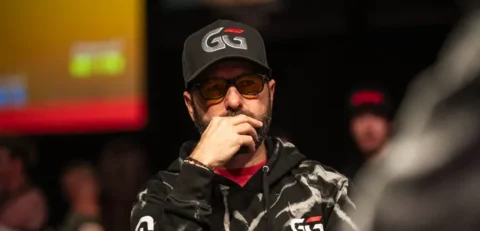Anaconda Poker
Poker is undeniably the most well-known card game globally, thanks to its various versions that add fun, entertainment, and challenge. You might have played Texas Hold’em and Omaha poker, but Anaconda poker is likely something you haven’t tried yet. For those keen to enjoy Texas Hold’em and Omaha, BLITZPOKER is a fantastic platform to experience both variants.
Anaconda Poker is a fun draw variant, closely linked to 7-card stud. It also goes by other names like Pass the Trash, 3, 2, 1 Left, and Screw Your Neighbour. In this version, the aim is to weaken your opponents’ hands while strengthening yours. Although similar to 7 Stud, the only common factor between Anaconda and 7-card stud is that players receive seven cards. However, in Anaconda, all players get seven face-down cards, unlike the mix of face-up and face-down cards in 7 Stud.
Here’s a quick guide that’s going to help you master this exciting poker variant. Anaconda Poker involves two to five or more players, using a standard 52-card deck, sometimes with one or two jokers included.
Anaconda Poker Gameplay
The betting begin with the player seated to the left of the dealer. Each player looks at their cards, and the first player passes any three cards to the left. The other players follow by passing three cards to the left as well. Once everyone has passed three cards, a betting round takes place.
After this round, a second pass occurs, followed by a third pass. In the third pass, each player only passes one card to the left. After the third pass, another betting round happens, leading to a showdown. The player with the best five-card high hand during the showdown wins the pot.
How to Play Anaconda Poker
Anaconda is based on traditional Seven Card Stud, where players aim to create the best five-card hand. However, the approach in Anaconda differs slightly from regular Stud.
At the start of each hand, players receive seven cards. The player to the dealer’s left initiates the first betting round. Players can choose to call, fold, or raise, just like in standard poker.
After the initial betting, each player passes three cards to another player. The direction of this pass, whether left or right, is agreed upon before the game starts.
Once passing is done, there’s another betting round. The first player to act usually rotates to the next player on the dealer’s left.
After this, players pass two more cards, often in the same direction. The passing can also shift to a new player, like skipping to the second player to the left or right, rather than repeating the first round’s recipient.
Another betting round follows after players receive their new cards. Then, each player passes one final card, leading to one more betting round. Just like in traditional Seven Card Stud, players can fold at any point.
Anaconda Poker Strategy
The card-passing and drawing element in Anaconda usually results in stronger hands compared to regular Seven Card Stud.
Being ready to fold even good hands is crucial in Anaconda Poker. For example, a player with two of a kind has a high chance of upgrading to a Full House, a powerful hand in this game.
Straight and Flush draws are also common due to the additional cards you receive.
Anaconda can also be played in a high/low split format, where the pot is divided between the best high hand and the best low hand. In this case, it’s vital to consider the player passing cards to you. If they typically aim for low hands, you might want to hold onto higher-drawing cards, and vice versa.
Lower straight-drawing hands can be valuable if they hit a low in a high/low split variation. It’s also wise to remember which cards you’ve already passed, as this helps plan future moves and predict what hands might be useful.
Pay attention to the stages where players reveal cards. Observing these can give you clues about the strength of your hand compared to others. If you realise you’re beat, don’t hesitate to fold.
In high-low games, be aware of potential high hands at the table. For instance, if several players seem to be going for high hands with no obvious lows in play, you could raise to increase the pot while riding a low hand. Similarly, if your high hand looks solid while others are chasing lows, raising to build the pot is a smart move.
Rules Of Anaconda Poker
- Each player is dealt seven cards face down. A betting round follows.
- After that, players pass three face-down cards to the player on their left. Then, there’s another betting round.
- Next, two face-down cards are passed to the left, leading to another round of betting.
- After this, each player passes one more face-down card to the left. Another betting round takes place.
- Once the betting ends, each player picks their five best cards and places them face down in a pile in front of them on the table.
- When prompted by the dealer, players reveal their top card. After everyone’s top card is shown, another betting round starts with the player holding the highest card. This process repeats until all cards are revealed. The game can be played for either high or low.
Poker Hands in Anaconda
To win at Anaconda Poker, knowing the hand rankings is crucial. Even if you’re already familiar with poker hands, it’s important to learn the specific rankings for this game. There are ten hand rankings in Anaconda Poker, with Five of a Kind being the highest and No Pair being the lowest.
Five of a Kind
Five of a Kind is the top-ranking hand in Anaconda Poker. It’s only possible when at least one card is wild. For example, K K
K K
K K
K Joker (Joker as wild) or A
Joker (Joker as wild) or A A
A 10
10 10
10 10
10 (10 as wild) are examples of Five of a Kind hands.
(10 as wild) are examples of Five of a Kind hands.
Straight Flush
In a game without jokers or wild cards, the highest hand is a Straight Flush. It has five cards all in sequence, all of the same suit. For example, J 10
10 9
9 8
8 7
7 forms a Straight Flush.
forms a Straight Flush.
Four of a Kind
Four of a Kind ranks just below the Straight Flush. It contains four cards of the same rank in different suits. For instance, K K
K K
K K
K or 8
or 8 8
8 8
8 8
8 are Four of a Kind hands.
are Four of a Kind hands.
Full House
A Full House consists of five cards – three of the same rank and two of another rank. For example, A A
A A
A 6
6 6
6 make a Full House.
make a Full House.
Flush
A Flush is a poker hand that consists of 5 cards of the same suit that are not in a sequence. For instance, A J
J 10
10 7
7 4
4 is a Flush.
is a Flush.
Straight
A Straight has five cards in sequence but from different suits. For instance, K Q
Q J
J 10
10 9
9 forms a Straight.
forms a Straight.
Three of a Kind
Three of a Kind includes three cards of the same rank and two other unrelated cards. For example, A A
A A
A 7
7 5
5 is a Three of a Kind hand.
is a Three of a Kind hand.
Two Pairs
Two Pairs consist of two pairs of different ranks and a fifth unrelated card. For example, J J
J 8
8 8
8 5
5 make Two Pairs.
make Two Pairs.
One Pair
One Pair has two cards of the same rank and three unrelated cards. For instance, A A
A 10
10 5
5 3
3 is a One Pair hand.
is a One Pair hand.
No Pair
No Pair, or High Card, is a hand without any matching ranks, suits, or sequences. For example, J 10
10 7
7 4
4 3
3 makes a No Pair hand. If multiple players have No Pair hands, the hand with the highest card wins. In this case, J
makes a No Pair hand. If multiple players have No Pair hands, the hand with the highest card wins. In this case, J is the highest card. If another player has an Ace or a King, it would beat the Jack-high hand.
is the highest card. If another player has an Ace or a King, it would beat the Jack-high hand.
Anaconda Poker Variations
To add some excitement, players often introduce variations to Anaconda Poker. Here are a few options:
- Change the number of starting cards, such as dealing six cards instead of seven.
- Adjust the number of cards passed. For instance, begin by passing four cards instead of three.
- Switch the passing direction. Cards could be passed to the right or diagonally instead of to the left.
- Limit betting rounds to just one round followed by a showdown after the passing rounds finish.
- You can also play a high-low variation wherein the pot is split between the players having the best high hand and the best low hand.
- Introduce wild cards by designating specific cards as wild.
- You can even remove all betting rounds to make the game quicker and more casual.
The post Anaconda Poker: Rules, How To Play, Strategy, Variations & More appeared first on BLITZPOKER.














